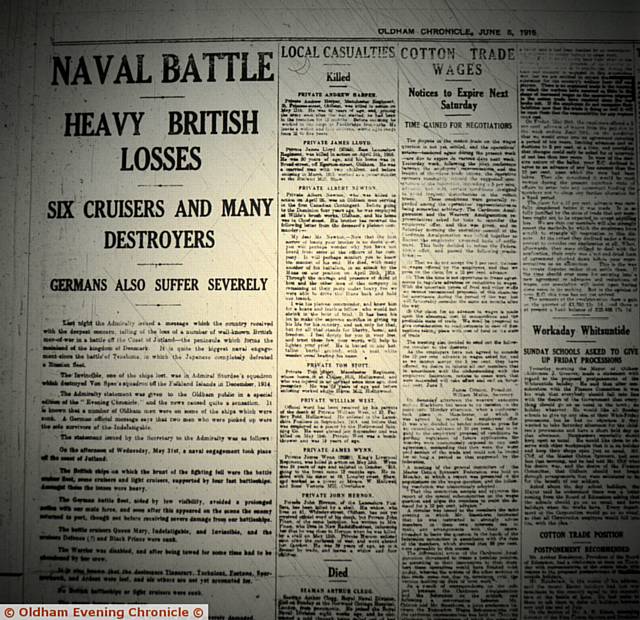Town to mark battle's centenary
Reporter: Iram Ramzan
Date published: 30 May 2016
TOMORROW will be a sombre day in Oldham, as the borough's residents mark one of the darkest days in the town's history.
It was 100 years ago, during the First World War, that saw 20 brave young men tragically killed in the Battle of Jutland.
The nation had an agonising, week-long wait before the news finally reached them.
In a special edition of the 'Evening Chronicle', on June 8, 1916, a statement was published from the Admiralty, causing a "sensation" in the town as news started slowly coming out that men from Oldham were among more than 6,000 British sailors who had lost their lives.
The Battle of Jutland was the only major naval battle of the First World War, which took place between the German High Sea Fleet and the British Grand Fleet. Jutland will always be remembered for the huge sacrifices British naval personnel made.
In 1914, Britain had the biggest and strongest navy in the world. Admiral Alfred von Tirpitz (1849-1930) greatly expanded the size and quality of the Imperial German Navy, until the German Navy grew to become one of the greatest maritime forces in the world, second only to the British Royal Navy.
In May 1916, with the majority of the British Grand Fleet anchored far away at Scapa Flow - in the Orkney Islands - Vice Admiral Reinhard Scheer believed the time was right to resume attacks on the British coastline.
Scheer ordered 19 U-boats to position themselves for a raid on the north-east coastal town of Sunderland, using air reconnaissance craft to keep an eye on the British fleet.
On May 30, a British fleet of 28 battleships, nine battle cruisers, 34 light cruisers and 80 destroyers set out from Scapa Flow, bound for positions off the Skagerrak - a strait running between the southeast coast of Norway, the southwest coast of Sweden, and the Jutland peninsula of Denmark.
A British naval force, commanded by Vice Admiral David Beatty, spotted German warships and confronted them some 75 miles off the Danish coast.
The two squadrons opened fire on each other simultaneously. This lasted around 55 minutes, during which time two British battle cruisers (HMS Indefatigable and HMS Queen Mary) were destroyed with the loss of 2,000 sailors.
The remainder of the German fleet joined, so Beatty was forced to fight a delaying action for an hour, until Admiral John Jellicoe arrived with the rest of the Grand Fleet.
Both fleets faced off in their entirety and a great battle of naval strategy commenced. As sections of the two fleets continued to engage each other throughout the late evening and the early morning of June 1, Jellicoe manoeuvred 96 of the British ships into a V-shape surrounding 59 German ships.
The German flagship, Lutzow, was disabled by 24 direct hits but was able, before it sank, to sink the British cruiser Invincible.
The German fleet withdrew under cover of darkness at 6.30pm on June 1, thus ending the battle.
The Battle of Jutland engaged a total of 100,000 men aboard 250 ships over the course of 72 hours. The German navy lost 11 ships, including a battleship and a battle cruiser, and suffered 2,500 casualties.
The British sustained heavier losses, with 14 ships sunk, including three battle cruisers, and 6,000 casualties.
Ten more German ships had suffered heavy damage and by June 2, 1916, only 10 ships that had been involved in the battle were still seaworthy.
Although it failed to achieve the decisive victory each side hoped for, the Battle of Jutland confirmed British naval dominance and secured its control of shipping lanes.
Among those who survived was Olympic gold medallist Henry Taylor. Henry was born in Maple Street, Hollinwood.
He was the star of Chadderton Swimming Club and took triple gold at the 1908 London Olympics.
Most Viewed News Stories
- 1Sentences handed down following 'brutal' manslaughter of Martin Shaw in 2023
- 2From the pitch to the classroom - Dan’s second career kicks off
- 3Police issue appeal following fatal collision on Asda car park in Shaw
- 4Two arrested following early morning raids in Royton
- 5Oldham Coliseum doors remain firmly shut





